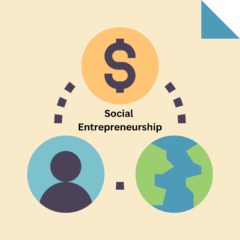What Is Social Entrepreneurship?
A social enterprise is a business, or a nonprofit organization designed around a core altruistic mission. Instead of a single bottom line focused on earnings, social enterprises measure success based on the 3 P’s:
- People – the human impact of the business
- Planet – the contribution to a sustainable planet
- Profit- the need to sustain the enterprise.
One of the most successful and high-profile social enterprises in Dallas is Café Momentum. The founder, Chad Houser, saw a need to change the juvenile justice system. Café Momentum is not just job training, it is life changing for the young men and women who participate in its programs. Bonton Farms is another example of a successful social enterprise that is attacking food insecurity in south Dallas. These two nonprofit organizations were founded on the social enterprise model.
One of the articles I read recently suggested that we view social enterprise as a spectrum, there is not just one right way, there is not just one answer. Some different types of social enterprise models described in the Wofford College article are:
- Nonprofit: A tax-exempt, non-business entity that invests excess funds back into the mission.
- Co-operative: A business organized by and for its members. Credit unions and community grocery stores are some examples of co-ops.
- Social purpose business: These businesses start on the foundation of addressing a social mission.
- Social firm: Social firms employ those in the community who need jobs, such as at-risk youth.
- Socially responsible business: These companies support social missions as a part of their day-to-day business operations.
- For-profit: Perhaps the vaguest category, these businesses are profit-first but donate funds, raise awareness, or otherwise support causes.
It is a myth that nonprofit organizations cannot earn money. A nonprofit founded in the traditional nonprofit model can create a social enterprise to support its mission so long as it abides by IRS rules and regulations. Probably the best known nonprofit social enterprises are Girl Scout cookie sales, and thrift stores such as those that support Goodwill and The Salvation Army. “Fees for service” could be considered another form of social enterprise.
The United Way of Metropolitan Dallas has their Social Innovation Incubator which
invests human, social and financial capital in early-stage (discovery and experimentation stages) entrepreneurs in the social innovation sector. The program is designed for entrepreneurs who have experienced systemic racial and gender inequities and who strive to drive impact in education, income and health in North Texas.
There’s more than one way to generate additional revenue for your organization. If your nonprofit organization is considering a social enterprise program, let me know.
Resources: Social Entrepreneurship 101: Business Models and Examples To Inspire You (Wofford College, January 18, 2023), Enterprising Nonprofits, Harvard Business Review, January-February 1998), What is the Difference Between a Nonprofit and a Social Enterprise (Tech Soup blog, April 28, 2021), United Way of Metropolitan Dallas website
At DMGroupConsulting, our goal is to help you achieve your goals. Schedule a free 30 minute consultation.




